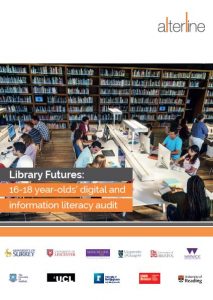We ran an update on this research project in 2023 , details below are for the ’16-18 year old information and digital literacy’ report we produced in 2017:
- Higher Education libraries can develop a more targeted and impactful induction programme based on a better understanding of the specific gaps in the knowledge and skills of new students
- Plan for service development using insight into the digital behaviours of the Higher Education students of tomorrow
- Inform strategic planning around investment in information and digital literacy skills development with independent information that’s available now
- Further Education libraries can better equip students for their studies and prepare them for the next steps in their education by understanding current levels of information and digital literacy.
More about the 16-18 year old information and digital literacy project
This research project was based on the online survey responses of 1,112 16 to 18 year-olds in the UK who were considering applying for, or had applied to, university. Three online focus groups were also conducted with 29 students. The report was completed in July 2017.
It explores the digital preparedness of 16- to 18-year-olds for their academic career at university.
As well as the full research findings, insights and evidence from the primary research project, the full 53-page report includes a review of the existing literature, an executive summary and practical recommendations.
Report contents include:
- What the current behaviours are of 16-18 year-olds when searching for, using and managing information
- Insight into the digital behaviours and digital lives of potential students
- Digital confidence and digital literacy
- Young people’s perceptions of what will be expected of them at university and what they expect of the university and the library service in particular
Project partners
This project was developed in partnership with a number of clients who helped to shape the research design through our collaborative Library Futures model. With thanks to:
- University of Surrey
- University of Leicester
- University of Manchester
- University of Glasgow
- University of Bristol
- Warwick University
- The University of Sheffield
- UCL (University College London)
- University of Nottingham
- UWE (University of West England)
- University of Reading






